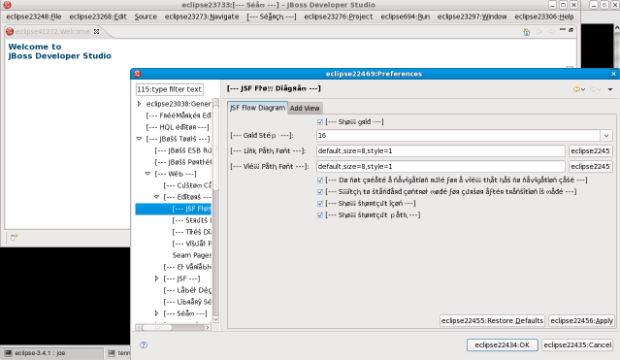Pseudo langpacks in action
This screenshot shows JBoss Developer Studio (dev version) together with Babel and JBoss Tools pseudo langpacks.
The unusual Unicode characters surrounded by [--- ---] are provided by the JBoss Tools langpacks. The eclipseNNNN:Something strings are provided by the Eclipse Babel langpacks. If we were using French langpacks, these strings would naturally be in French, but pseudolocales (a) can be generated instantly from English text and (b) remain readable as English (once you get used to them!).
Anything in plain English is most likely text which has been hard-coded, either in Eclipse or in JBoss Tools, so the goal is to get rid of any plain English! Any hard-coded text in the above screenshot is there purely for demonstration purposes!
Building langpacks
($jbt is the directory containing JBoss Tools source code)
In a terminal window:
- cd $jbt/i18n
- ant cleanpot #[temporary workaround]
- ant all
Installing langpacks via update site (for precompiled JBT/JBDS)
NB: For now, you will need to build the langpacks yourself as shown above.
In Eclipse+JBoss Tools 3.0, or JBoss Developer Studio 2.0:
1. use Help/Software Updates/Available Software/Add Site to add the directory
$jbt/i18n/target/jars/ as an update site, and hit OK.
2. select the new entry "JBoss Tools Localization Update Site", open it up, and select the entire group for Pseudo Locale (en_AA), or other language when real translations become available
3. click Install, and follow your nose.
4. While you're at it, you should probably install one or more of the translations for Eclipse, from the Babel project. Use this update site: http://download.eclipse.org/technology/babel/update-site/ganymede
If your operating system is set to a non-English locale, and you installed the right langpack, Eclipse should come up in that language next time you run it.
On the other hand, if you are using a pseudolocale like en_AA, you will have to force Eclipse to use that locale. Just change your Eclipse/JBDS shortcut to append the options "-nl en_AA"
Installing langpacks the hard way (launching JBT from within Eclipse)
Eclipse 3.4's new update manager P2 doesn't work inside self-hosted Eclipse instances, so we can't use the update site approach. Instead, we use something far more painful...
1. Download all the Babel plugins (v3.4) for your chosen language from one of the mirrors here: http://www.eclipse.org/downloads/download.php?file=/technology/babel/babel_language_packs/.
(NB: If you don't want to download them one by one, you can use Firefox's addon DownThemAll with the fast filter "en_AA_3.4".)
2. Unzip the plugin zips under $jbt/i18n/babel, for example:
- cd $jbt/i18n; mkdir babel; cd babel
- for f in ~/BabelLang*.zip; do unzip -qq $f; done
3. In Eclipse's Preferences, select Target Platform, click Reload, then click Add to bring up a wizard, then select File System and Add the directories $jbt/i18n/target/jars/plugins/ directory and $jbt/i18n/babel/eclipse/plugins/.
4. Create an Eclipse Application launch profile with "all workspace and enabled plugins" and the extra command line "-nl en_AA". (Or your preferred locale.)
Now, whenever you run that launch profile, you should get Babel and JBoss Tools langpacks.
IMPORTANT: Whenever you recompile the langpack plugins with "ant all", you will have to perform step 3 again, since the new build number causes the jar filenames to change. As a shortcut, you can use "ant quick" [formerly ant reall] to rebuild langpacks with the same build number, but be aware that this won't pick up new ResourceBundles.
NOTE: Sometimes, you will find that Eclipse refuses to compile the JBT source code, and complains that it can't find basic classes like java.lang.Object or org.eclipse.swt.SWT. (This often happens if Eclipse has crashed and tries to recompile the entire workspace.) If this happens, you will have to go back to Preferences/Target Platform, click Reload and OK to remove the extra plugins. Then go back in and add the plugins directories again (step 3).
Using and testing pseudo langpacks
Babel pseudo langpacks for en_AA prepend every string with something like eclipseNNNN: or webtoolsNNNN:.
JBoss Tools langpacks replace "Finished building project {0}" with the Unicode string "[--- Fîňîšⱨéđ Ьմîŀđîňց pяøʝéçŧ {0} ---]".
Any strings which appear in plain English have not been externalised. For each string, we will have to work out whether it should be part of a Babel langpack or JBoss Tools.
- Externalisation of JBoss Tools strings is covered by JBIDE-3557.
- Unexternalised strings in Eclipse.org projects should be reported to the relevant project: https://bugs.eclipse.org/bugs/.

Comments